“Six days ago the army attacked our village. They were firing everywhere. They shot my wife in the back. She died from the wound,” said Abdul Rahman, a Rohingya refugee who fled Myanmar for Bangladesh.
The 21 year old widow carries his four month old baby in his arms.“The baby won’t stop crying. I’m asking lactating mothers to help with feeding her, but I’m so worried. I don’t know if she will survive. We have no food. We have nothing at all,” he said.
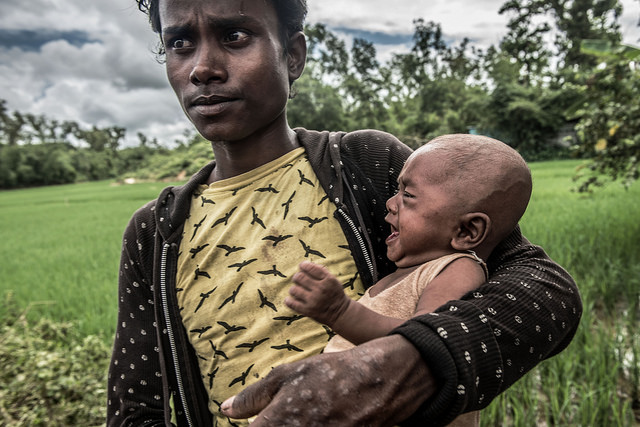
Abdul Rahman, 21, cares for his four month old daughter Sangida, after her mother was shot dead by Burmese soldiers while trying to flee to Bangladesh.
Nearly about 400,000 have fled violence in Myanmar, crossing into neighbouring Cox’s Bazar in Bangladesh. They are living in makeshift camps, temporary shelters in villages or under the open sky. They are completely dependent on food aid, clean water is scarce and sanitation is dire.
A leafy green hillside is transformed within hours into a refugee camp. “Everywhere you look men are hauling around bamboo poles which they use to build their shelters,” said photographer Tommy Trenchard, who is with a Caritas Bangladesh team.
A rickshaw with a loud speaker trundles past blaring out a message about a missing 7 year old girl who hasn’t been seen for four days. Of those who have crossed since violence intensified in August, 200,000 are believe to be children. They are at incredible risk and need urgent support.
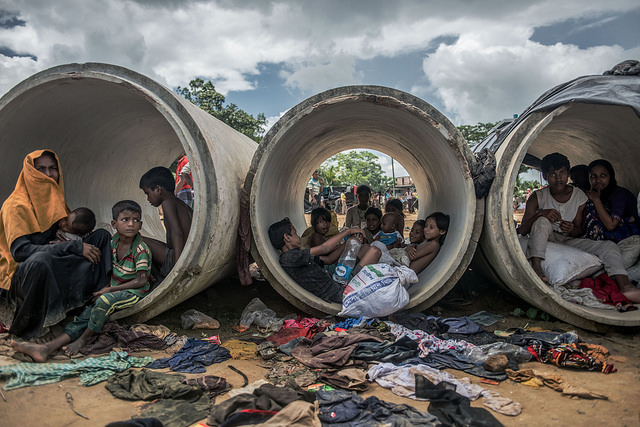
Recently arrived Rohingya refugees shelter inside drainage pipes at a reception area in southern Bangladesh.
“Many people have bullet injuries,” said Trenchard. “One boy was shot through the shoulder. Another had two bullet holes in his arm and a third was hobbling around on crutches, after his leg had to be amputated.”
In Kutupalong camp, each tent contains different stories of horror from across the border.
“We have nothing” said one recent arrival at the camp, who fled her village in Mangdu district when soldiers arrived and started shooting. “All we took was the clothes we were wearing. They killed my son. He was only 25.”
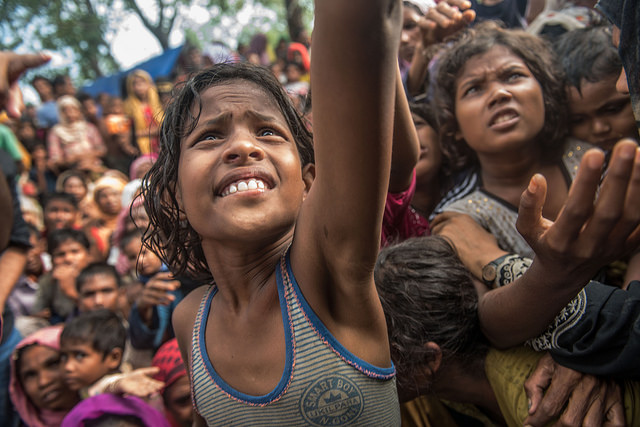
Girls reach for food handouts during a distribution by a volunteer organisation in Kutupalong camp.
One man explains how he had been walking through the jungle for over two weeks, after soldiers raided his town killing indiscriminately. Among the dead were his father and his son.
“We walked a long way” he said. “Every time we saw the army we had to hide. And we had no money for food. Some days we would not eat anything at all.”
Looking across the Naf river into Myanmar, plumes of smoke rise from burning villages, while desperate Rohingya arrive in crowded wooden boats. A further 400,000 people are thought to be displaced within Myanmar, where aid agencies have no access.
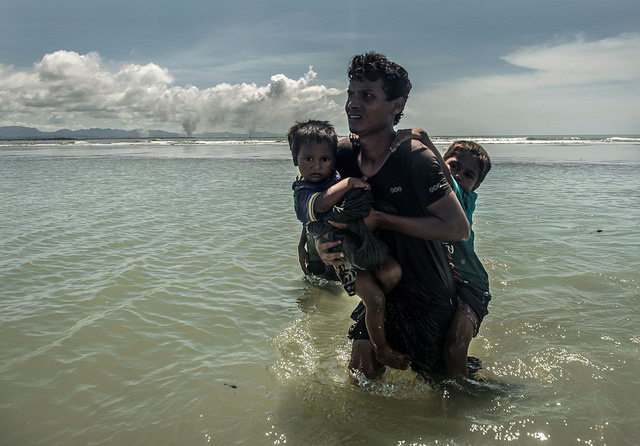
Rohingya refugees from Mongdu district in Myanmar arrive on the Bangladeshi island of Shah Porir Dwip after fleeing violence at home.
“We had to pay 10,000 taka for the boat to cross into Bangladesh,” said Dilda Begum, 38, from Udong village in Mangdu district. “We arrived here the day before yesterday, and yesterday we built this shelter. We didn’t bring a thing. I just grabbed the children and ran”.
The children lie on the floor, gripped with fever. “The soldiers came to the next village to ours and started looting everything,” she said. “As we ran away, we passed three more villages, all burning. Outside a village on the border, the soldiers shot my father.”
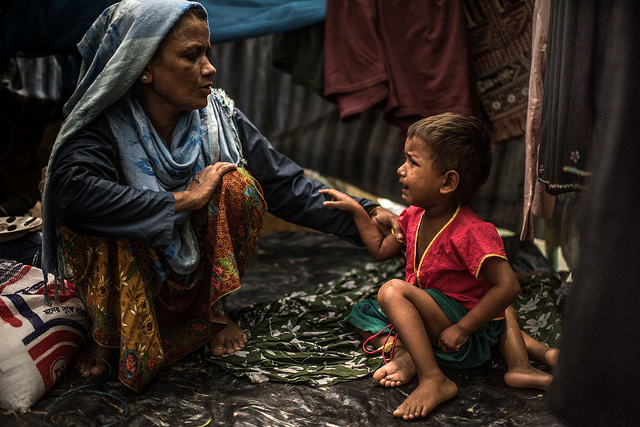
Dilda Begum and one of her sick children.
Caritas Bangladesh has carried out rapid assessments in the border areas and conducted interviews with Rohingya families. Caritas staff say that the immediate needs are food, water, food, sanitation, shelter, medicines and measures for child protection.
“We could see our houses burning from across the river,” said Mohamed Alamgir, 27. His whole family, including one year old Sumaya are ill. “We don’t have a lot of money, so food is a problem for us,” he said.
Caritas Bangladesh plan to distribute food and non-food items to 70,000 Rohingya people. Each family will receive 15kg of rice, 2kg of pressed rice, 3kg of dal (pulse), 1kg of salt, 1kg of sugar and 1ltr of edible oil, as well as kitchen utensils.
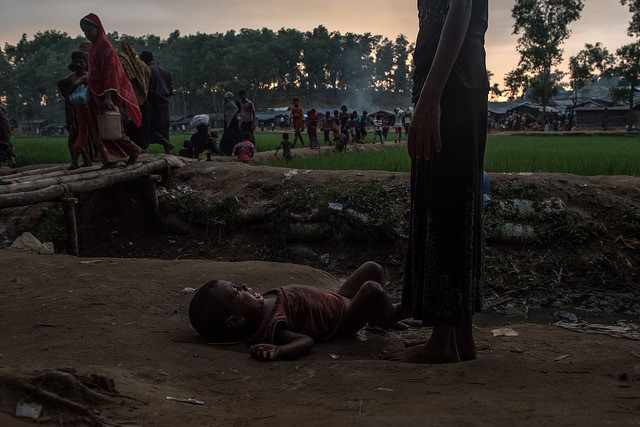
A Rohingya baby has a tantrum as her sister attempts to wash her in the Kutupalong refugee camp in southern Bangladesh.
“There are hundreds of thousands of people who have been forced from their homes. They have nothing. It’s a tragic situation both inside and outside the country,” said Caritas Internationalis Secretary General Michel Roy.“Violence and aggression must stop. Humanitarian agencies need unimpeded access. The dignity of the Rohingya must be recognised.”
Rajida Begum, 30, cradles a new-born baby. “On the 30 August they came and started shooting, especially at the young men and boys,” she said. “We were crying a lot. As soon as we had a chance we fled the village with our neighbours. After we left they set our village on fire.
“For four days I hid myself in the forest, then we tried to walk to the border. I was so scared”. Begum gave birth on the 5th day under a piece of plastic sheeting in the middle of a rice paddy: “When I saw that she was healthy I was so happy. I gave thanks to God”.
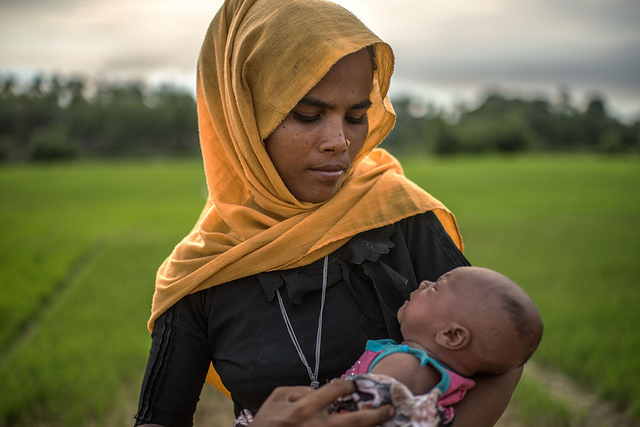
Rajida Begum, 30, holds her still-unnamed 14 day old baby, who was born in a rice paddy as Begum fled the Burmese army.
Who are the Rohingya?
The Rohingya are an ethnic minority who live mostly in Rakhine State on the western coast of Myanmar, and practice Islam. They have been marginalised and forced to accept poor living conditions in the border areas of Bangladesh and Myanmar for decades.
In the 1980’s, Myanmar’s government denied the Rohingya their nationality, claiming that their presence in Myanmar was not legal. Since then, there has been an influx of Rohingya asylum-seekers into Bangladesh, especially during periods of persecution in Myanmar.
The situation for Rohingya became even worse in October 2016 when the Arakan Rohingya Salvation Army (ARSA) first attacked a police post in Myanmar, killing nine police men. The latest crisis began on 25 August, when ARAS again launched multiple attacks on government posts in Rakhine state and Myanmar security forces launched counter attacks.
Please support the work of Caritas Bangladesh through Caritas Internationalis or online via your national Caritas organisation. All photos: Tommy Trenchard/Caritas
